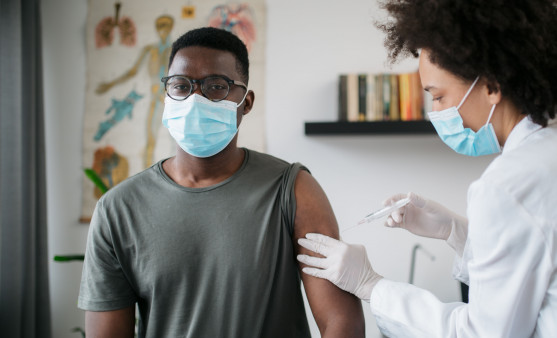In late March, the Centers for Disease Control and Prevention (CDC) issued an alert about an increase in invasive meningococcal disease, with the highest annual number of cases reported since 2014. People living with HIV, Black people and those ages 30 to 60 are disproportionately affected. Meningococcal disease is potentially life-threatening and requires prompt medical attention. The CDC urges all people for whom meningococcal vaccination is recommended—including HIV-positive people—to stay up to date with their vaccines.
Meningococcal disease, caused by Neisseria meningitidis bacteria, can cause meningitis (inflammation of the membranes covering the brain and spinal cord) and septicemia (bloodstream infection). The classic symptoms of meningococcal meningitis include fever, headache and a stiff neck, but many of the current cases have presented with unusual symptoms.
Different Neisseria meningitidis strains, or serogroups, can cause meningococcal disease. As of March 25, the CDC had received reports of 143 cases of invasive serogroup Y meningococcal disease, far exceeding the 81 cases reported during the same period in 2023; 422 cases were reported for all of 2023. These cases largely involve serogroup Y sequence type (ST) 1466.
Of the serogroup Y ST-1466 cases reported last year, 65% were among men, 65% were among people ages 30 to 60 and 63% were among Black people. This is unusual, as historically, meningococcal disease has disproportionately struck young infants, teens and young adults and elderly people over 85.
What’s more, 15% of the serogroup Y ST-1466 cases were among people living with HIV. This strain has contributed to previously reported increases in meningococcal disease among people with HIV. Based on updated surveillance data, 24 such cases were reported among HIV-positive people during 2022–2023, including four who were previously vaccinated. A recent study found that people with HIV are six times more likely to develop invasive meningococcal disease, with the greater risk for those with low CD4 T-cell counts.
About two thirds of people with serogroup Y ST-1466 meningococcal disease presented with bacteremia (bacteria in the bloodstream), and about 4% had septic arthritis, or infection of the joints. Among the 94 people with known outcomes, 17 died. This alarming 18% case fatality rate is higher than the 11% rate reported for serogroup Y in past years.
All tested serogroup Y ST-1466 isolates were susceptible to first-line antibiotics recommended for post-exposure prophylaxis and treatment. However, the CDC previously reported that ciprofloxacin-resistant serogroup Y Neisseria meningitidis is on the rise, disproportionately affecting Latino people.
According to the CDC, health care providers should have “heightened suspicion” for meningococcal disease, particularly among disproportionately affected populations, and should be aware that patients may present without typical meningitis symptoms. Blood and cerebrospinal fluid cultures should be obtained for those with suspected meningococcal disease.
“We’re not recommending any unusual precautions,” CDC epidemiologist Lucy McNamara told the Washington Post. “We would like for the general public to be aware of the symptoms of meningococcal disease and to contact their health care provider if they or members of their family have those symptoms” and “want to make sure that they’re up to date for meningococcal vaccinations.”
Transmission and Prevention
Meningococcal bacteria are present in saliva and respiratory secretions and can spread via coughing, kissing or sharing food and drinks. Transmission can occur between people who live together, such as family members. Although the infection is still uncommon, clusters have been reported in recent years, for example, among college students. Although related to the Neisseria gonorrhoeae bacteria that cause gonorrhea, Neisseria meningitidis is not considered a sexually transmitted infection, but clusters have occurred among gay and bisexual men.
Symptoms of meningococcal meningitis may include fever, headache, stiff neck, nausea, vomiting, sensitivity to light and altered mental status. Symptoms of bloodstream infection may include fever, chills, fatigue, vomiting, diarrhea, cold hands and feet, severe aches and pains, rapid breathing and a dark purple rash. Symptoms typical worsen rapidly, and the disease can become life-threatening within hours, necessitating immediate antibiotic treatment.
Fortunately, meningococcal infection is preventable with vaccines. The MenACWY meningococcal conjugate vaccine (Menveo or MenQuadfi) protects against four different types, including the Y serogroup. The MenB vaccine (Bexsero or Trumenba) protects against Neisseria meningitidis serogroup B, and it may also offer some protection against gonorrhea.
The CDC recommends the MenACWY vaccine for adolescents at age 11 or 12, with a booster dose at 16. Vaccination is also recommended for military recruits, college students living in dorms and people living in or traveling to communities experiencing a serogroup A, C, W or Y outbreak. A two-dose vaccine series is recommended for children and adults at increased risk due to medical conditions, including those living with HIV. Those at ongoing increased risk need regular booster doses.
The MenB vaccine is recommended for adolescents and adults who are immunocompromised and those who are at increased risk due to an outbreak. Again, those who remain at increased risk need regular booster doses. This vaccine is currently not routinely recommended for adults and adolescents living with HIV.
People ages 10 and older can get a recently approved vaccine called Penbraya that protects against all five serogroups if they are eligible to receive the MenACWY and MenB vaccines at the same time.







Comments
Comments